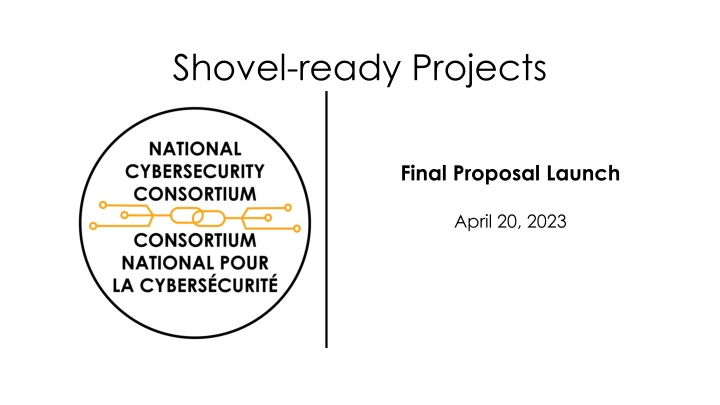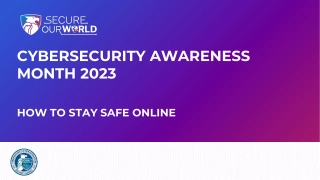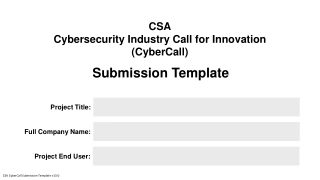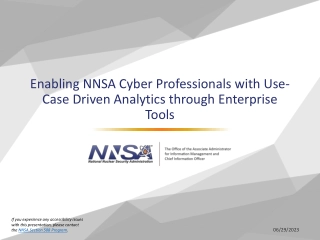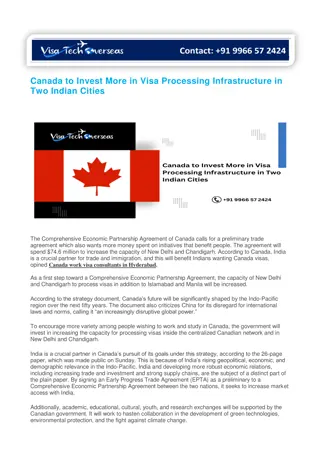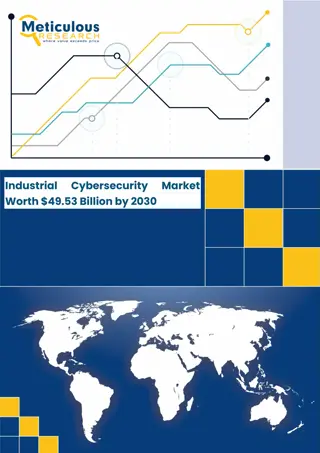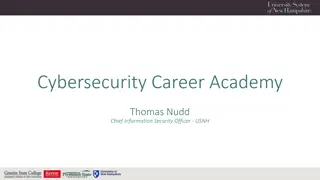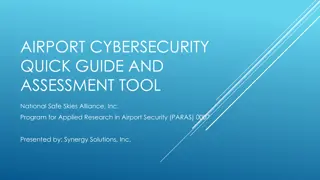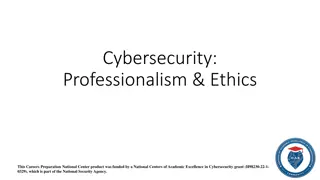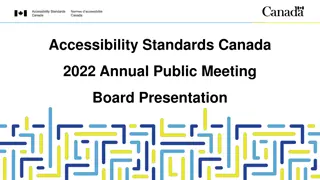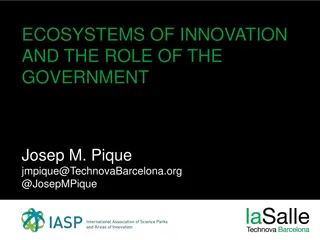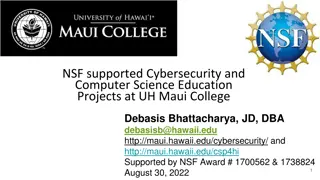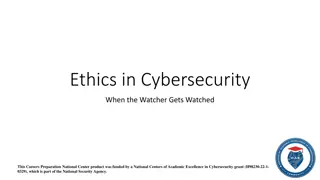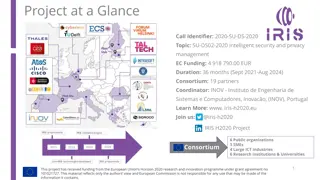Shovel-Ready Projects Initiative for Cybersecurity Innovation in Canada
This proposal outlines the launch of the Shovel-Ready Projects Initiative aimed at advancing cybersecurity innovation and talent development in Canada. The program, led by the National Cybersecurity Centre (NCC), seeks to fund eligible projects that enhance cybersecurity capabilities through research, development, commercialization, and training. Key dates, eligibility criteria, project streams, and objectives are detailed, emphasizing collaboration between academia, industry, and not-for-profit organizations to bolster Canada's cybersecurity ecosystem.
Download Presentation

Please find below an Image/Link to download the presentation.
The content on the website is provided AS IS for your information and personal use only. It may not be sold, licensed, or shared on other websites without obtaining consent from the author.If you encounter any issues during the download, it is possible that the publisher has removed the file from their server.
You are allowed to download the files provided on this website for personal or commercial use, subject to the condition that they are used lawfully. All files are the property of their respective owners.
The content on the website is provided AS IS for your information and personal use only. It may not be sold, licensed, or shared on other websites without obtaining consent from the author.
E N D
Presentation Transcript
Shovel-ready Projects Final Proposal Launch April 20, 2023
Agenda Overview of the NCC Overview of the Cyber Security Innovation Network (CSIN) Call for Proposals for Shovel-ready Projects Project Funding & Assessment Timelines Questions
Vision and Mission Vision: Advancing cybersecurity innovation and talent development in Canada. Mission: To grow a pan-Canadian network that works with private and public sectors to lead world-class cybersecurity innovation and talent development and to increase cybersecurity-related economic activity in Canada.
Cyber Security Innovation Network (CSIN) Program Launch: May 6. 2021 Vision/Mission: Strengthening cybersecurity network and capacity in Canada Supporting the growth of Canada's cyber security ecosystem through industry-academia collaboration Enhancing research and development, increase commercialization, and support the development of skilled cybersecurity talent across Canada
Eligible Applicants Lead Recipient is the NCC. Ultimate Recipient means one or more of the following types of organizations selected by the Lead Recipient to receive funding to carry out Eligible Projects: Centres of expertise in cybersecurity affiliated with post-secondary institutions; Private sector; Canadian post-secondary institutions; and, Not-for-profit organizations
Cyber Security Innovation Network (CSIN) Deadline for Submitting Applications: July 25, 2021 Selection of the Lead Recipient: February 17, 2022 Contribution Agreement finalized and signed: June 28, 2022 Call for full proposals of shovel-ready projects Issued: April 20, 2023 Deadline: Commercialization and Training: June 1, 2023 Research & Development: June 15, 2023
Project Streams Funding to Support Establishing research and development projects between post- secondary researchers and industry to answer cybersecurity challenges; Supporting the commercialization of intellectual property created by Canadian researchers; and, Training new cybersecurity workers and upskilling existing cybersecurity workers to meet Canada s cybersecurity labour market demand.
Elements of a Good Project? Economic, innovation, and social benefits Technological advancement Technical feasibility Potential for commercialization Collaboration Diverse mix of organizations Regional representation Equity, Diversity and Inclusion Key Performance Indicators to be achieved Strengthens and promotes the sustainability of the Lead Recipient
Successful Applicants Will Need to Demonstrate Cybersecurity Plan Data Management Plan Equity, Diversity and Inclusion Framework Demonstrated financial capacity to carry out their Eligible Projects IP Agreements in place as required Compliance with National Security Guidelines for Research Partnership Risk Assessment
Information that Goes into Application Application Form with word limits Application Templates including: Project Costs (Template A) Personnel Costs (Template B) Project Financing (Template C) In-kind cost listing (Template D) Major Project Milestones (Template E) Activities to be Conducted (Template F) Key Performance Indicators (Template G) Commercialization Strategy (required for Commercialization Projects) (Template H)
How are Projects Funded Lead Recipient will distribute the Contribution to Ultimate Recipients for the purpose of conducting Eligible Projects. Project funding (apart from the NCC funding) will have to be demonstrated/confirmed. Cost-matching limits associated with in-kind contributions (per year) Federal investment from other programs will not be eligible for project matching purposes. Projects are maximum of three to four years but year four is subject to federal funding appropriations being obtained.
How are Projects Funded? (continued ) Cost limits and eligible costs/activities are outlined in the Costing Memorandum (Schedule 2) Project will have an Ultimate Recipient that will act as project lead. Funds will flow from the NCC to the Ultimate Recipient.
How are Projects Funded? (continued ) Standard projects: Projects from industry, academia, and not-for- profit organizations within the following project categories. Maximum Permissible Sharing Ratios covered by NCC Type of Project R&Ds Up to 47% of the project eligible costs Training Up to 47% of the project eligible costs Commercialization Up to 30% of the project eligible costs Sharing ratio means the proportion of costs covered by NCC funds.
How are Projects Funded? (continued ) Spearhead Projects: projects which are forward-looking research or training projects that consist only of post-secondary educational institutions (PSE) and/or, when appropriate, not-for-profit organizations as Ultimate Recipients. In this call, NCC will fund a limited number of spearhead projects for up to 10% of the total budget of the call. Project themes: Critical Infrastructure Protection, Network Security, Software Security, Human-Centric Cybersecurity, and Privacy Protection. Research Spearhead: Normally up to a maximum of $30k/year/PI; at least two institutional partners in a Spearhead Research project; require private sector partner by final year of project. Three years max duration. Training Spearhead: Normally up to a maximum of $300k/year/Ultimate- Recipient. Three years max duration.
Eligible Sources of Matching Funds Private Sector Provincial/territorial/municipal governments Not-for-profit institutions Canadian post-secondary institutions
Key Performance Indicators (KPIs) KPIs selected according to project type reporting requirements are outlined in the KPI template. Mandatory versus non-mandatory. For all project types, we need to know the number of project participants by type and geographic location the dollar value leveraged (both cash and in-kind) from industry and other partners. Option to add additional KPIs (non-mandatory). Regular reports updating progress on KPIs and project details to be submitted.
Project Evaluation Process An Independent panel of qualified experts will review the proposals Panelists will be subject to confidentiality and conflict-of-interest considerations Ratings will be assigned based on the following categories: Management; Technical; Commercialization (optional); Financial; Economic Benefits; EDI; Collaboration
Timelines Project applications must be received by the following dates: Training and Commercialization June 1, 2023 Research & Development - June 15, 2023 It is anticipated that reviews/approvals will be completed in mid-August.
